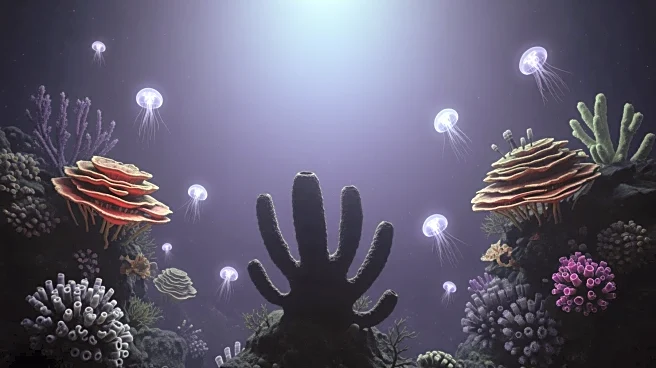What's Happening?
Scientists have confirmed the discovery of 30 previously unknown deep-sea species, including a carnivorous sponge dubbed the 'death-ball.' This discovery was made during research cruises conducted by The
Nippon Foundation-Nekton Ocean Census and the Schmidt Ocean Institute. The findings were verified at the Southern Ocean Species Discovery Workshop in Chile. Among the new species is Chondrocladia sp. nov., a predatory sponge that uses hooks to trap prey, deviating from the typical passive filter-feeding behavior of most sponges. The expeditions also documented 'zombie worms' that feed on whale bones using symbiotic bacteria. The Ocean Census mission explored volcanic calderas and seafloor habitats, collecting nearly 2,000 specimens and capturing extensive video footage.
Why It's Important?
The discovery of new species in the deep sea is crucial for understanding marine biodiversity and ecosystems. These findings can inform conservation efforts and policy decisions, particularly as deep-sea environments face threats from climate change and human activities. The identification of species like the 'death-ball' sponge highlights the complexity and adaptability of life in extreme environments. This research contributes to scientific knowledge and can influence future studies and exploration strategies, potentially leading to new insights into marine life and its role in global ecological processes.
What's Next?
Further analysis of the collected specimens and data will likely continue, with researchers aiming to understand the ecological roles and potential applications of these new species. The findings may prompt additional expeditions to explore other unexplored deep-sea regions. Conservationists and policymakers might use this information to advocate for protective measures for vulnerable marine habitats. The scientific community will likely engage in discussions about the implications of these discoveries for marine biology and environmental science.
Beyond the Headlines
The discovery of new species in the deep sea raises ethical and environmental questions about human impact on these ecosystems. As exploration technology advances, there is a need to balance scientific curiosity with the preservation of fragile habitats. The findings also underscore the importance of international collaboration in scientific research, as global efforts are required to address the challenges facing marine environments.










